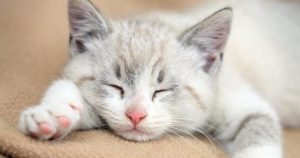Cats are known for their laziness and can often be seen dozing off after a play session. Both kittens and adult cats sleep a lot, and this is perfectly normal. In this article, we will explore how many hours of sleep cats need per day and whether your cat’s sleeping habits are normal.
Wild and domestic cats spend a surprisingly large proportion of their lives sleeping. Their anatomy and physiology are designed for short bursts of intense activity, such as hunting, rather than endurance. This means that cats need to conserve energy, and sleep is an essential part of their natural behavior. They often rest in warm, comfortable places like windowsills or their favorite cushions. Most of their sleep consists of short naps, but on average, cats sleep for about 16 hours a day.
Studies of cats’ brainwaves have identified two types of sleep: deep sleep and light sleep. Cats spend 30% of their sleep time in a deep sleep and 70% in a lighter sleep from which they can easily be awakened. During deep sleep, cats may dream, and you might observe slight movements of their paws, whiskers, or ears, and occasionally some sounds.
Whether sleeping or awake, cats constantly process environmental stimuli and respond accordingly. In scientific experiments where cats were placed in stimulus – free environments, their brain activity, as recorded by EEG, gradually reduced to the minimum required for bodily functions. Unlike humans in similar conditions who might daydream or reminisce, cats do not engage in such mental activities due to lack of stimulation.
Cats’ sleep patterns are also influenced by their age and environment. Kittens and older cats tend to sleep more than adult cats. A kitten may sleep up to 20 hours a day due to their rapid growth and development. Senior cats also require more rest as their energy levels decrease with age.
Environmental factors play a significant role in a cat’s sleep. Cats feel safest in a familiar and comfortable environment. Providing a quiet, cozy sleeping area can help ensure good sleep quality. Changes in the environment, such as new sounds or smells, can disrupt their sleep patterns.
In conclusion, cats’ sleeping habits are a natural part of their biology. Most cats need around 16 hours of sleep daily. If your cat’s sleep habits change suddenly or it shows signs of excessive sleepiness or lethargy during the day, consult a veterinarian to rule out any health issues. Otherwise, enjoy your cat’s peaceful sleeping moments as a charming aspect of their feline nature.

